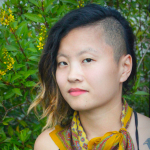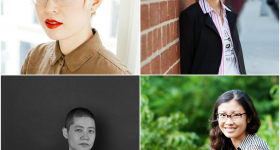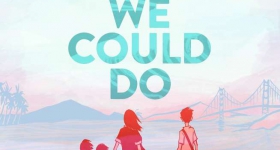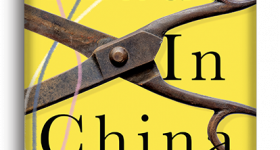This summer, I met with a dear friend and poet, Muriel Leung. For me, it feels like kismet that both our books — Imagine Us, The Swarm (hers) and Cleave (mine) — were released a month apart in Spring 2021. We’ve known each other for many years now, first meeting as undergrads at Sarah Lawrence College. We talked about the paths that led to the creation of our books and the power of Asian American mentorship and poetry as a means for healing.
This interview has been edited for length and clarity.
When I was a senior in high school, I was paired with (poet and mutual friend) Rachelle Cruz for prospective students’ night [at SLC], and she brought me to my first APICAD meeting (APICAD = Asian Pacific Islander Coalition for Action and Diversity). Having grown up in a white family in a predominantly white town, it was the first time I had ever been in a room with peers of color, and being welcomed in this space was so affirming. It was the reason I decided to go to SLC. Supported and surrounded by this community, I learned about critical race theory, intersectionality and the campaign for ethnic studies, and I was able to finally lean into my identity as a Korean American and begin to understand my positionality as a transnational transracial adoptee within larger systems of colonialism and power. It was also at this time that I began to develop my voice as a poet. How did our shared early space in college inform you and your consciousness? What learning do you still carry from this time?
Building movements requires slow and arduous work, but in between, you make room for joy. — Muriel Leung
The organizing that we did at Common Ground, a student of color space, and APICAD was profoundly educational for me. At 18, I entered college with a very limited understanding of what it meant to be Asian American despite having grown up in predominantly Asian neighborhoods and schools — NYC Chinatown to Flushing, Queens. Being in such close proximity to other Asians and growing up in the majority should foster an early sense of awareness, but the whiteness attached to opportunity and educational advancement created a level of dissonance for me, and it seemed no other East Asian person around me questioned it either. It was not until I received an invitation to Common Ground’s opening at the start of my first year as a new student of color that I first explicitly recognized myself as a person of color, and that was revelatory. I think back to my early years at Sarah Lawrence as a time of fumbling and trying to play catch-up for what felt like lost time. In the process, I got caught up in fights that were not my own, was reactive when I could have slowed down, and definitely did not work through my trauma enough to take on certain causes that incited greater strain. My takeaway from all of this: Building movements requires slow and arduous work, but in between, you make room for joy.
It’s hard to think back on Sarah Lawrence and not see how my political involvement with spaces like Common Ground and APICAD went hand in hand with the evolution of my poetry writing. Understanding how I moved through the world as a queer Asian American femme gave me a sense of social and political purpose, and it gave my writing the depth of soul that I could not access in high school where I was encouraged to “write my culture” or pander to certain racial and gender archetypes.
How much of this formative experience at Sarah Lawrence made its way into Cleave (if at all)? And what moments in your life would you say brought you to this phenomenal debut?
I appreciate what you said about fumbling and playing catch-up. I realize now how I felt such urgency to have it all figured out, and in my rush, I made many mistakes along the way.
I remember when my first-year roommate, Sam, asked if I was interested in going back to Korea, and I answered with a decisive no. At the time, I was carrying so much unprocessed grief, shame and rage. Abstractions like disembodiment, haunting and loss were constantly resurfacing in my poems. It wasn’t until I took a class with Cathy Park Hong during my last semester of my last year that I began to write directly into my experience as a transracial adoptee. Working with Cathy and being seen and validated for the first time by another Korean American poet gave me the courage to finally go there. A number of the poems in Cleave can trace their roots back to this class. (Though I remember bringing some of these poems to workshop once, and a white student said that this new work wasn’t as compelling as the previous work I’d been submitting to class.)
We were never in class with Cathy at the same time, but I know your experience was also impactful. What did it mean for you to study with an Asian American poet at such a formative moment? In what ways did this experience influence the writing of Imagine Us, The Swarm?
The first Asian American poet I studied with was Tina Chang. I had stumbled upon her poem, “Letter to a Stranger,” in my last year of high school and being so moved by it, it was like recognizing a piece of yourself in something. I was stunned to learn that Tina taught at Sarah Lawrence and registered for her class immediately. I was so intimidated by her, mostly because I projected so much of my desire to be seen by someone who looked like me and who embodied a certain type of literary life that I aspired to. Tina was the one who introduced me to spaces like the Asian American Writers’ Workshop, and she also encouraged me to apply to Kundiman. Just the process of engaging with these spaces, getting to know the works of Asian American writers who passed through these spaces, exposed me to a new community I never knew of until then.
I didn’t study with Cathy until later at Sarah Lawrence. While Tina introduced me to Asian American literary life, Cathy exposed me to Asian American experimental writing, particularly by women writers. She had me look up Theresa Hak Kyung Cha, Bhanu Kapil and Mei-mei Berssenbrugge, writers who in turn continue to influence and challenge my work deeply.
I felt Tina and Cathy’s investment in me, and I’m sure much of it came from the knowledge that these barriers to access can be especially hard for Asian American women if there isn’t someone to help show you the way. In a sense, Imagine Us, The Swarm is very much born from passing on knowledge as an homage to women and femmes of color, particularly Asian American women and femmes who have shown me different ways to be strong and resilient. This collection is experimental as well as lyrical, a constellation of lessons cultivated throughout the years, and a celebration of all the ways we have survived in spite of the barriers against us.
I feel that this spirit of survival is very much alive in Cleave too. What has the writing and publishing of this book taught you so far?
[July 9] was June Jordan’s birthday, and in my scrolling, I came across this quote: “Poetry means taking control of the language of your life.” As a kid, I didn’t have the space or language to articulate what I was thinking and feeling, and I learned early not to rock the boat. Don’t you have a line in a poem about making yourself palatable? That really resonates with my early experience. As a result of my displacement and adoption, I had absorbed a fear of my existence being easily mutable and worried that if I wasn’t agreeable, then everything could change.
Through poetry, I found the language to consider and critique the world around me. In some ways, writing the book was like working through the various stages of grief — rage, resentment and acceptance ebbing and flowing. Ultimately, Cleave provided an opportunity for repair that didn’t exist elsewhere. I could finally take control of the language of my life.
Reading Imagine Us, The Swarm, I loved noticing how some of our poems are kindred in the ways we project alternate realities and create personal mythologies. I see it emerge in echoes of fairy tales:
“That I swallowed my words for six years until they were as rotten as me.
So she planted a sword in herself.
And I took the sword and sunk it down in my grotto.
In such variable tricks, we survived for years.”
“Once when I was a jar, I invited a stranger home to rattle me. He shook and he shook. He saw that inside the jar was a city within water and the lights were bare.… When he left, I collected his broken things, which were vital to powering my city.”
[I also see it in] the speculative nature of the “Suppose” series in the final section. I love this series’ insistence on survival and possibility through imagining the future. I’d love to hear your thoughts on the imaginary and the role it plays when envisioning what’s possible for your past and future selves.
What I found incredible about Cleave was not only watching the journey of this book unfold through your writing of it, but that the book itself so accurately mirrors that traversal of rage, grief and self-acceptance. I think you and I turn to mythology, revisionist tales and the speculative in the face of what has been constantly denied to us as children. So much of Imagine Us, The Swarm is about healing the wounded child in me and allowing her to dream again, and I feel that surge of possibility in your writing too. I think of your poem “Personal Fiction,” in which you describe a memory that may or may not have taken place, stating, “I will tell you these things even if they aren’t true. I will convince myself late into the night until I feel the grass grazing my toes, the sun’s heat on my back.” I don’t read this as a lie but as an invention of something that has been lost, to fill in the gaps of one’s origin story.
Do you think we succeeded? Do you think the writing of our books can give us the future we dreamed up on the page?
I, too, often imagined a younger version of myself while writing Cleave. Writing my book — and years of therapy! — gave me the strength to resurrect and hold this confused and anxious little girl. In some poems, we’re in dialogue together, working through our memories and giving them shape. In others, she finally has a voice to ask questions, reckon with the past and build new mythologies. For me, the page will always be the first place I turn to when imagining what’s possible, especially when it comes to dreaming of the future we want and deserve. From there, I believe we can shift worlds, especially if we’re doing it together.
What do you think?
I think so, I hope so, I know so.










Comments